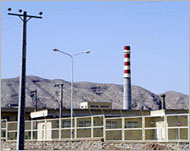Iran’s president nominates cabinet
Iran’s President Mahmood Ahmadinejad has unveiled a new conservative cabinet, with Tehran warning the West not to resort to bullying over its nuclear programme.

Among the key appointments on Sunday submitted to parliament for approval, Ahmadinejad proposed Ali Saidloo as oil minister of the OPEC member, and conservative MP Manoushehr Mottaki as foreign minister.
Saidloo, Ahmadinejad’s successor as mayor of Tehran, is a relative unknown in national Iranian politics, while Mottaki has been ambassador to Japan and Turkey.
Iran bluntly told US President George Bush that it would respond to any attack and warned that it could consider ending a freeze on uranium enrichment, a process that can make fuel for a nuclear bomb.
“Bush should know that our capabilities are much greater than those of the United States,” Foreign Ministry spokesman Hamid Reza Asefi told reporters. “We don’t think that the United States will make such a mistake.”
US threat
|
“Bush should know that our capabilities are much greater than those of the United States” Hamid Reza Asefi, |
The US president on Friday refused to rule out the use of force against Iran over its resumption of limited nuclear activities last week, saying “all options are on the table”.
His stance was opposed by Germany, one of the three European countries that have been negotiating with Iran over its nuclear work, with Chancellor Gerhard Schroeder saying military options “don’t amount to anything”.
The standoff between Iran and the West reached crisis point last week when Tehran defiantly resumed uranium conversion, the initial stage in the nuclear fuel cycle, despite international warnings.
The International Atomic Energy Agency’s board called on Iran to halt the work and ordered the UN watchdog to report back on 3 September on Tehran’s compliance with international safeguards.
IAEA pressure
But the IAEA, which has been investigating Iran for more than two years after determining it had hidden nuclear activities over two decades, stopped short of referring Iran to the UN Security Council, which could impose sanctions.
Asefi said the resumption of uranium conversion work at a facility in the central city of Isfahan, which converts uranium ore into feed gas used in enrichment, was “not negotiable”.
He said the Iranian government had not reached a consensus on enrichment, a process that makes fuel for nuclear reactors but can also be the core of an atomic bomb.
“But the attitude and the actions of the Europeans in the next few days will be the determining factor,” Asefi said.
EU talks
 |
|
Iran ended its freeze on |
Iran had suspended its nuclear activities in November for the duration of negotiations with the so-called EU3 of Britain, France and Germany over its nuclear programme.
But it ended the freeze on conversion after rejecting as “unacceptable” a package of trade, security and technology incentives from the European Union in return for guarantees that its nuclear programme is purely peaceful.
Iran denies it is seeking the bomb and says it has the right to nuclear technology under the Non-Proliferation Treaty of which it is a signatory.
The nuclear issue is likely to dominate Ahmadinejad’s new 21-member government, which was presented to parliament on Sunday ahead of a confidence vote due to be held within a week.
Appointments
Among the other cabinet positions, former deputy intelligence minister, Mostafa Pour-Mohammadi, was tipped to head the Interior Ministry while Ahmadinejad chose the former head of a strict religious tribunal, Gholamhossein Mohseni-Ejei, to head the Intelligence Ministry.
Hossein Safar Harandi was proposed for the Culture Ministry.
Ahmadinejad, who won a shock election victory in June, has promised a “government of moderation” although his opponents have portrayed him as an extremist.